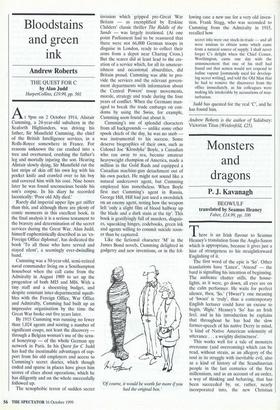Bloodstains and green ink
Andrew Roberts
THE QUEST FOR C by Alan Judd HarperCollins, £19.99, pp. 501
At 9pm on 2 October 1914, Alistair Cumming, a 24-year-old subaltern in the Seaforth Highlanders, was driving his father, Sir Mansfield Cumming, the chief of the British Intelligence services, in a Rolls-Royce somewhere in France. For reasons unknown the car crashed into a tree and overturned, crushing the father's leg and mortally injuring the son. Hearing Alistair slowly dying, Sir Mansfield cut the last strips of skin off his own leg with his pocket knife and crawled over to his boy and covered him with his coat. Nine hours later he was found unconscious beside his son's corpse. In his diary he recorded laconically: 'Poor old Ally died.' Rarely did imperial upper lips get stiffer than this, and although there are plenty of comic moments in this excellent book, in the final analysis it is a serious testament to the bravery and determination of the secret services during the Great War. Alan Judd, himself euphemistically described as an 'ex- Foreign Office diplomat', has dedicated the book 'To all those who have served and stayed silent', a seemingly ever-dwindling band. Cumming was a 50-year-old, semi-retired naval commander living on a Southampton houseboat when the call came from the Admiralty in August 1909 to set up the progenitor of both MIS and MI6. With a tiny staff and a shoestring budget, and despite constant inter-departmental squab- bles with the Foreign Office, War Office and Admiralty, Cumming had built up an impressive organisation by the time the Great War broke out five years later. By 1915 Cumming was running no fewer than 1,024 agents and scoring a number of significant coups, not least the discovery — through a Belgian woman's use of the sexu- al honeytrap — of the whole German spy network in Paris. In his Quest for C Judd has had the inestimable advantages of sup- port from his old employers and access to Cumming's secret diaries, which though coded and sparse in places have given him scores of clues about operations, which he has diligently and on the whole successfully followed up.
The xenophobic terror of sudden secret
invasion which gripped pre-Great War Britain — as exemplified by Erskine Childers' classic thriller The Riddle of the Sands — was largely irrational. (At one point Parliament had to be reassured that there were not 66,000 German troops in disguise in London, ready to collect their arms from a depot near Charing Cross.) But the scares did at least lead to the cre- ation of a service which, for all its amateur- ishness and occasional absurdities, did Britain proud. Cumming was able to pro- vide the services and the relevant govern- ment departments with information about the Central Powers' troop movements, morale, strategy and trade during the four years of conflict. When the Germans man- aged to break the trade embargo on con- doms by using the Swiss, for example, Cumming soon found out about it. Cumming's use of splendid characters from all backgrounds — unlike some other spook chiefs of the day, he was no snob — was instrumental to his success. Some deserve biographies of their own, such as Colonel Joe 'Klondyke' Boyle, a Canadian who ran away to sea, became amateur heavyweight champion of America, made a million in the Gold Rush and equipped a Canadian machine-gun detachment out of his own pocket. He might not sound like a natural undercover agent, but Cununing employed him nonetheless. When Boyle first met Cumming's agent in Russia, George Hill, Hill had just used a swordstick on an enemy agent, noting how the weapon left 'only a slight film of blood halfway up the blade and a dark stain at the tip'. This book is gratifyingly full of murders, disguis- es, squeaking hinges, codebooks, green ink and agents willing to commit suicide soon- er than be captured.
Like the fictional character 'M' in the James Bond novels, Cumming delighted in gadgetry and new inventions, or in the fol- 'Of course, it would be worth far more if you had the original box.'
very lowing case a new use for a ve old inven- tion. Frank Stagg, who was seconded to Cumming from the Admiralty in 1915, recalled how
secret inks were our stock-in-trade — and all were anxious to obtain some which came from a natural source of supply. I shall never forget C's delight when the Chief Censor, Worthington, came one day with the announcement that one of his staff had found out that semen would not respond to iodine vapour [commonly used for develop- ing secret writing], and told the Old Man that he had to remove the discoverer from the office immediately, as his colleagues were making life intolerable by accusations of mas- turbation.
Judd has quested for the real 'C', and he has found him.
Andrew Roberts is the author of Salisbury: Victorian Titan (Weidenfeld, f25).


















































































 Previous page
Previous page